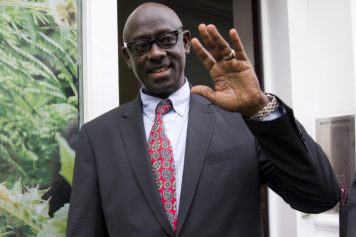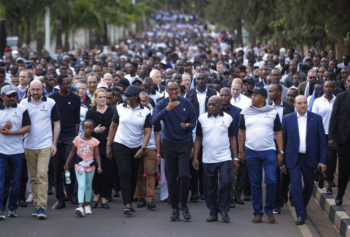For the first time in weeks, a sense of hope has returned to the residents of eastern Congo, as the M23 rebels have withdrawn from the city of Goma and several hundred government troops have come to take their place.
Though the nation knows that the rebels, who are squatting about a mile from Goma, a city of more than a million people, could return at any time and a full-fledged war could commence, for now the residents are coming out of hiding and breathing a sigh of relief.
The M23 rebels finished their withdrawal of Goma on Saturday, in compliance with an agreement reached between the rebel group and a regional body, but they say they will take back Goma if the government does not agree to negotiate with them by Monday.
When the Congo army soldiers rode into Goma earlier today, they were greeted by singing and cheering crowds and even women rushing forward to kiss them, according to an Associated Press report.
Observers are taking the return of the troops as a sign that Congo’s crisis just may be over.
“We felt like we were living in captivity during the 11 days of the rebel occupation,” Goma-based lawyer Emilie Mwanda told Africa Review.
“We were not allowed to walk freely; we could also not use our cars without risking to be pulled out by the rebel troops,” she said.
The rebels left a pillaged city in their wake, with shops plundered, and many goods and government records and computers stolen. Soldiers were deployed across the city to act as a security force—trying to regain some of the pride that was lost when many of them literally ran from the city when the M23 rebels came marching in two weeks ago.
As the M23 rebels rode into Goma, an important population and economic center, the Congolese army actually ran away and about 1,500 UN peacekeepers didn’t lift a finger to stop the rebels. The M23 have caused as many as 100,000 people to flee their homes, according to aid organizations such as Oxfam and UNICEF. Nearly half a million Congolese already live in camps because of the decades of violence. Aid groups are struggling to get food and supplies to them.
In Goma, chaos and despair was widespread as the Congolese feel helpless in the face of the rapes and murders that seem to accompany the M23 wherever they go. There was a fear that if the M23 were intent on advancing across the country, it would soon blow up into a full-fledged war similar to the last Congolese war, which lasted over a decade and killed more than an estimated three million people. Those fears are still alive, even though the rebels have retreated.
When the commander of the Police, Gen Charles Bisengimana, arrived from Kinshasa yesterday, intending to boost the morale of the policemen, police who had not fled the city came out and assured the commander that they were ready to resume duty.
The presence of the policemen has given reassurance to the residents, according Lukeka bin Miya, a Goma-based journalist.
“Shops are progressively reopening and day-to-day life is back to normal,” he told Africa Review.
He added: “For the first time, I left my house and walked around. I saw some school buses carrying taking pupils to schools. Only banks and money transfer agencies remain closed.”
Journalist Michel Fwamba, had opted to go into hiding throughout the duration of the M23 occupation because he has been told the rebels threatened to kill him.
“We are very relieved to see these guys leaving the city even if we do not trust their expressions of good faith,” said Fwamba, who worked for a local radio station. “Something tells me that they are not leaving completely. I left my hiding place because I expected they had withdrawn entirely.”
During the M23’s occupation, some FM radio and TV stations were forced to closed and journalists were forced to flee after they were accused of broadcasting “propaganda.”


